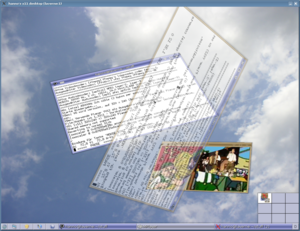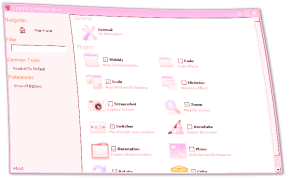Sunday, January 28. 2007
More fancy desktops: Metisse
 Read about Metisse just yesterday. A new approach to fancy/3D-Desktops by Mandriva. Unlike compiz, metisse has features that let you actually use windows in transformed status. Mandriva has some videos (Edit 2016: link down, archived version and videos on youtube) that show you some of the features.
Read about Metisse just yesterday. A new approach to fancy/3D-Desktops by Mandriva. Unlike compiz, metisse has features that let you actually use windows in transformed status. Mandriva has some videos (Edit 2016: link down, archived version and videos on youtube) that show you some of the features.As you may already have expected, I couldn't wait to create some ebuilds, so fetch my overlay (which is still called xgl, but don't care about that) for fancy x stuff and run emerge metisse:
svn co https://svn.hboeck.de/xgl-overlay
At the moment it requires it's own X-Server (very much like luminocity or xgl in the past), the window and composite manager is a modified variant of fvwm. After installing, run Xmetisse :1 on one console and on another one metisse-start-fvwm -wd :1. You'll get a fancy new desktop inside a window.
At the moment it very much looks like a design study, not really intuitive to use, but it has some interesting approaches. Nice to see that the linux desktop is evolving. For all non-gentooers, Mandriva has a live CD for you.
Wednesday, January 24. 2007
Vortragsmaterialien Vista, MacOS, DRM
Wir (Bernd und ich) hielten gestern im Rahmen einer Veranstaltung der LUG Backnang und des CCWN einen Vortrag mit Kritik an Vista, Mac OS und DRM allgemein. Ich erlebe gerade die Arbeit für freie Software allgemein sehr positiv, so meinte etwa ein Zuschauer, im Oktober hatte er Probleme mit seiner XP-Aktivierung, die der Meinung war, er hätte eine illegale Version und seit Dezember nutzt er Linux.
Wie üblich die Vortragsmaterialien (diesmal exklusiv als ODP, ich geh inzwischen davon aus, dass das jeder kann), Teil 1 und 3 waren von mir, Teil 2 von Bernd:
Slides Teil 1 (DRM), Slides Teil 2 (Windows Vista), Slides Teil 3 (Mac OS)
Gezeigtes Filmmaterial: The Corruptibles, A movie about Trusted Computing
Wie üblich die Vortragsmaterialien (diesmal exklusiv als ODP, ich geh inzwischen davon aus, dass das jeder kann), Teil 1 und 3 waren von mir, Teil 2 von Bernd:
Slides Teil 1 (DRM), Slides Teil 2 (Windows Vista), Slides Teil 3 (Mac OS)
Gezeigtes Filmmaterial: The Corruptibles, A movie about Trusted Computing
Posted by Hanno Böck
in Computer culture, Copyright, Linux, Politics
at
12:11
| Comments (5)
| Trackbacks (0)
Thursday, January 18. 2007
Erster Freifunk-Node in Murrhardt
Kürzlich hatten wir beim Treffen der LUG Backnang besuch von den Freifunkern aus Weinstadt. Nach einem interessanten, teilweise durch für mich unverständliches Fachsimpeln über technische Details von Antennen unterbrochenen, Vortrag, hat uns das Freifunk-Fieber gepackt.
Bernd lotet gerade schon aus, wohin er überall von Köchersberg aus Sichtverbindungen hat, mein erster Freifunk-Node (mit olsr) ist bereits Online gegangen. Im LUG-Wiki lässt sich die weitere Entwicklung verfolgen.
Bernd lotet gerade schon aus, wohin er überall von Köchersberg aus Sichtverbindungen hat, mein erster Freifunk-Node (mit olsr) ist bereits Online gegangen. Im LUG-Wiki lässt sich die weitere Entwicklung verfolgen.
Tuesday, January 16. 2007
Fluendo retracing the steps of Novell
Fluendo, a company working with gstreamer, recently announced the availability of commercial, binary codecs for some multimedia formats. They list WMA, WMV, MMS, MPEG-2, MPEG-4, ASF and MP3.
Now, this raises some interesting questions for me: Pretty much all those codecs are already well supported by free implementations, ffmpeg and others. The only exception I can see is WMA3, which is still unsupported by free alternatives, but rarely used. Even the latest Windows Media Video, based on VC-1, has recently gained support by ffmpeg. So from a technical viewpoint, the codecs are basically of very low importance.
The issue that they don't mention in their press release is probably: We provide you with commercial codecs and save you from patent threads. Now that raises the question of software patents. For europe it's very doubtful if the covered patents are legal at all - as we know the EU has rejected the »legalization« of software patents back in 2005, keeping the uncertain situation we had before.
In strategic considerations for the free software community, this case is probably similar to the Novell-Microsoft deal - and raises the same problems Bruce Perens pointed out in his Open Letter: If there's a »licensed« way to use MPEG and other patented formats in linux - then this might weaken the position of projects fighting software patent threats against free software.
So, if you think software patents should be abadoned (which every free software developer should do), raise your voice against questionable patent agreements with those companies earning their money from software patents.
Now, this raises some interesting questions for me: Pretty much all those codecs are already well supported by free implementations, ffmpeg and others. The only exception I can see is WMA3, which is still unsupported by free alternatives, but rarely used. Even the latest Windows Media Video, based on VC-1, has recently gained support by ffmpeg. So from a technical viewpoint, the codecs are basically of very low importance.
The issue that they don't mention in their press release is probably: We provide you with commercial codecs and save you from patent threads. Now that raises the question of software patents. For europe it's very doubtful if the covered patents are legal at all - as we know the EU has rejected the »legalization« of software patents back in 2005, keeping the uncertain situation we had before.
In strategic considerations for the free software community, this case is probably similar to the Novell-Microsoft deal - and raises the same problems Bruce Perens pointed out in his Open Letter: If there's a »licensed« way to use MPEG and other patented formats in linux - then this might weaken the position of projects fighting software patent threats against free software.
So, if you think software patents should be abadoned (which every free software developer should do), raise your voice against questionable patent agreements with those companies earning their money from software patents.
Saturday, January 6. 2007
Updates on compiz in Gentoo (now with kde-decorator)
 I've just committed some compiz-related updates to Gentoo. First we now have version 0.3.6, the most interesting news is probably that it now has a working kde-window-decorator. gnome/kde-stuff is now only enabled on use-flags, so if you wanna continue to use gconf, you'll have to build compiz with the gnome-flag.
I've just committed some compiz-related updates to Gentoo. First we now have version 0.3.6, the most interesting news is probably that it now has a working kde-window-decorator. gnome/kde-stuff is now only enabled on use-flags, so if you wanna continue to use gconf, you'll have to build compiz with the gnome-flag.compiz-start tries to autodetect a running kde and then run the kde-window-decorator. If compiz-start fails for you, please report it, because I plan to deprecate all the compiz-aiglx/xgl/nvidia-scripts.
Beside that we now have compiz-settings in the tree, which is a simple configuration-tool for compiz and saves you from using gconf manually.
(Page 1 of 1, totaling 5 entries)